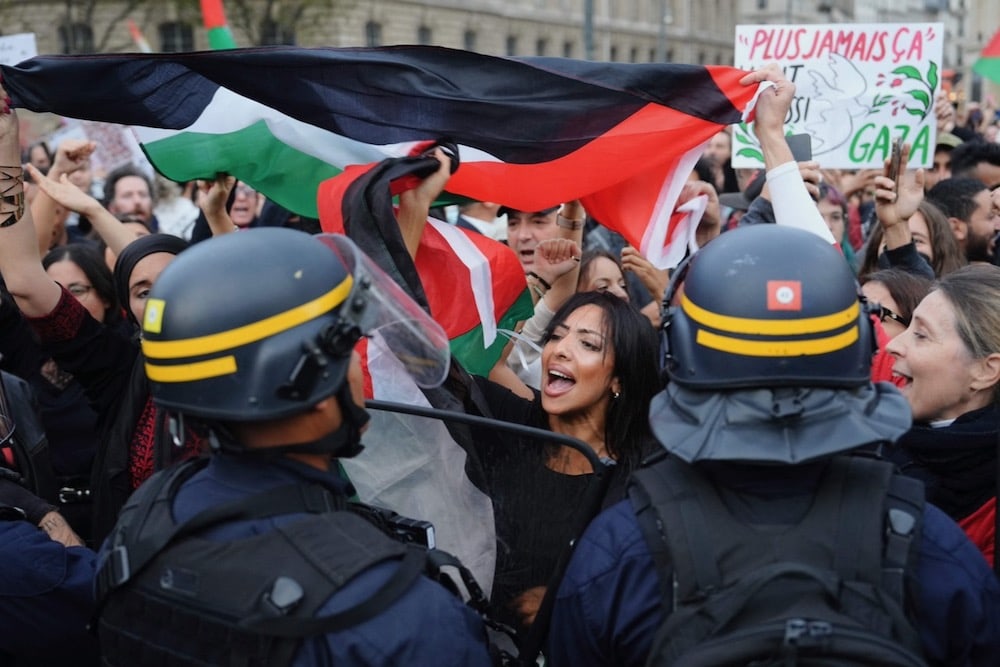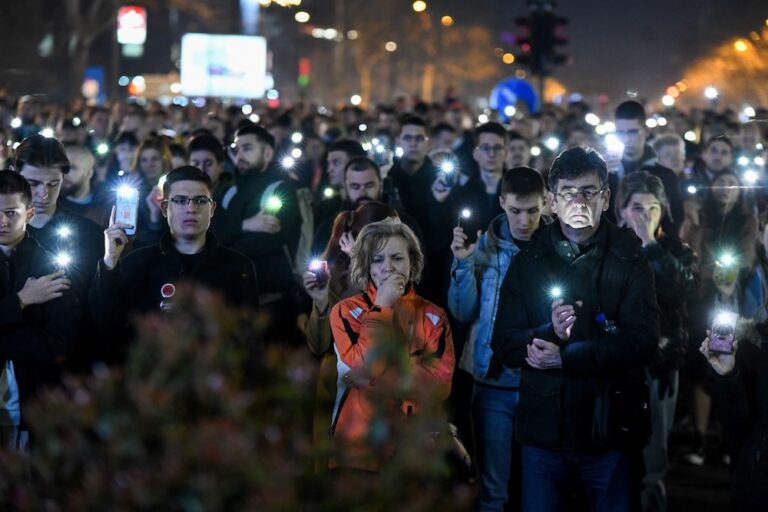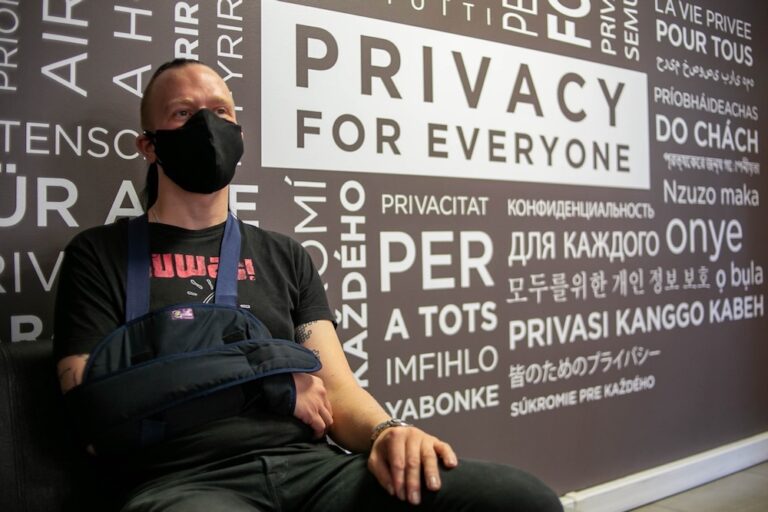November 2023 in Europe and Central Asia: A free expression round up produced by IFEX's Regional Editor Cathal Sheerin, based on IFEX member reports and news from the region.
A chilling response to expressions of solidarity with Palestinians; an International Day of Solidarity with Belarus; and Russia continues its persecution of dissent, “foreign agents” and LGBTQI+ persons.
Attempts to stifle pro-Palestinian expression in Europe
October and November saw civic space come under increasing pressure as authorities in various European countries sought to restrict (or smear) popular expressions of solidarity with Palestinians and protests against Israel’s bombardment of Gaza.
In November, ARTICLE 19 and PEN International issued statements condemning the imposition of bans, restrictions, and/or the exertion of political pressure on pro-Palestine rallies and events in Austria, France, Germany, Hungary, Switzerland, and the UK. Both organisations reminded states of their obligation to protect the rights to freedom of expression and peaceful free assembly in a functioning democracy.
In Germany, the authorities’ response to acts of solidarity with Palestinians, especially in the first few weeks after Hamas’s attack on Israeli civilians on 7 October, was heavy-handed and created a chilling environment for free speech. Members of Berlin’s Palestinian community told Reuters that they were “nervous about speaking out, fearful of being labelled pro-Hamas in a country where supporting Israel is sacrosanct”.
In an article outlining the German authorities’ response (a response partly rooted in the German state’s very one-sided approach to Israel and the Occupied Territories), journalist Ben Mauk discusses some of the bans imposed and arrests made for often mild acts of solidarity with the Palestinian people. He also describes the Islamophobic and anti-immigrant sentiments expressed by some leading politicians in the wake of 7 October, the sometimes heavy police presence in neighbourhoods with large Muslim populations, and his own experience of observing an unauthorised protest in his neighbourhood in Berlin:
“For several days, the neighbourhood had felt under police occupation, with armed patrols and police vans a constant part of public life. At the demonstration, I watched dozens of riot police incite and escalate conflicts with protesters, beating and brutalizing those who were chanting ‘free, free Palestine’ in the street or holding Palestinian flags. When I attempted to film the particularly violent arrest of a Palestinian flag-waver, I was maced by a police officer while holding my press credentials in my hand.”
Mauk is one of over 100 Jewish writers, journalists, academics and cultural workers who published an open letter in October, calling on Germany to “adhere to its own commitments to free expression and the right to assembly”.
October saw France’s Interior Ministry issue a directive imposing a blanket ban on all pro-Palestinian rallies. Immediately after the ban was announced, a protest of thousands in Paris was dispersed by police using tear gas and water cannons. The Council of State, France’s highest administrative court, later ruled that bans on protests could continue, but that they should be issued on a case-by-case basis.
In the UK, an ugly brew of Islamophobia and political opportunism marked the government’s response to Palestinian solidarity actions and anti-war protests. The hard-right Home Secretary (since dismissed), backed-up by various right-wing tabloids, smeared these overwhelmingly peaceful demonstrations as anti-Semitic “hate marches”, “Islamist”, and “an assertion of primacy” by extremists. She also wanted a pro-Palestinian rally planned for Armistice Day (11 November) banned, and was accused of “inciting” far right groups to confront the pro-Palestinian event. On the day in question, these far-right Islamophobes attacked the police in central London to chants of “You’re not English anymore” and “England ‘til I die”.
Pro-Palestinian expression also came under chilling pressure on UK college campuses. Academics have described an increase in surveillance of their social media, resulting in staff and students being reported to the university authorities, the police, and the Prevent counter-terrorism strategy. Palestinians and people of colour are over-represented among these cases, which have sometimes resulted in investigations and/or suspensions of individuals from their academic institutions. Middle East Eye interviewed one female student who “was reported for a social media post which they had not posted” and who was “held for 15 hours in a police cell under suicide watch”.
In the weeks that followed Hamas’s October attack, Europe saw several instances of so-called ‘cancelling’, where high-profile cultural figures or artistic productions deemed sympathetic to the Palestinian people (or critical of Israel) were deplatformed or shut down.
Some prominent examples include the Frankfurt Book Fair’s cancellation of an award ceremony for a novel by the Palestinian writer Adiana Shibili; Liverpool Hope University’s cancellation of a lecture by the renowned Israeli historian and Israel critic Avi Shlaim; German TV network ARD’s removal of a Palestinian comedy film, Wajib, from its schedule due to concerns over its “narrative perspective”; and the cancellation of a Palestinian film festival in Bristol, the UK.
The newspaper Forward has published a non-exhaustive list of cancellations and firings (in Europe and elsewhere) of individuals and events due to their perceived pro-Palestinian sympathies.
Solidarity with Belarus
While the suppression of critical voices in Belarus continues, so do the international acts of solidarity with those whom the Lukashenka regime has targeted.
November saw civil society groups, activists and politicians mark the International Day of Solidarity with Belarus, with the EU once again calling for the immediate and unconditional release of Belarus’s almost 1,500 political prisoners.
The Belarusian Association of Journalists’s (BAJ) global Solidarity Marathon for Imprisoned Journalists continued, and saw the welcome involvement of exiled opposition leader Sviatlana Tsikhanouskaya, high-ranking politicians from Lithuania and Ireland, and IFEX members. There were also solidarity events in the Czech Republic, Canada, Poland, Ukraine and the UK.
Reporters Without Borders’s (RSF) solidarity action for jailed Belarusian editor Maryna Zolatava saw the organisation deliver hundreds of messages of support for the journalist – on her birthday – to Belarusian embassies in Paris, London, Berlin, Bern, Stockholm, Vienna, and Washington DC.
The invaluable work of BAJ, which released a report in November on the situation for independent media and civil society over the last year, was recognised once again when the organisation received the Eastern Partnership Civil Society Forum’s 2023 Civil Society Prize.
November saw Alexander Mantsevich, director of the newspaper Regionalnaya Gazeta, sentenced to four years in prison for “discrediting Belarus”.
The month also saw the Supreme Court reduce freelancer Viachaslau Lazarau’s prison sentence by 6 months to five years; his wife, Tatsiana Pytsko, who was previously sentenced to three years in prison, had her punishment reduced to a three-year suspended sentence. In September, the couple were found guilty of working with the Belsat TV channel, which has been labelled “extremist” by the authorities.

IFEX staff express solidarity with imprisoned Belarusian journalists in front of City Hall in Toronto, Canada, 7 November 2023.
A shocking sentence and a disturbing pardon
In Russia, the authorities continue to persecute those who criticise the invasion of Ukraine.
This month saw a shocking seven-year prison sentence handed to artist and activist Aleksandra Skochilenko. She was convicted under a law introduced shortly after Russia invaded Ukraine that outlaws the dissemination of “fake” information about the army. The charge was based on Skochilenko’s activism in March 2022, in which she replaced supermarket price tags with information about Russia’s war on Ukraine.
Other disturbing news from Russia included the reported pardoning of Sergei Khadzhikurbanov, one of the men convicted for the 2006 murder of journalist Anna Politkovskaya. According to Khadzhikurbanov’s lawyer, his client’s pardon – which the International Press Institute (IPI) described as a “reprehensible perversion of justice” – was granted after he agreed to fight with the Russian army in Ukraine.
November also saw new additions to Russia’s list of so-called “foreign agents”. These included exiled former Prime Minister and critic of the Ukraine war, Mikhail Kasyanov, and The Moscow Times.
Rights groups and media organisations continue to campaign for Radio Free Europe Radio Liberty (RFE/RL) journalist Alsu Kurmasheva, who remains in pre-trial detention while she awaits trial on charges of failing to self-register as a “foreign agent”.
The Russian authorities’ ongoing legislative war against LGBTQI+ people shows no signs of abating. This month, the Ministry of Justice began legal proceedings to recognise the “international public LGBT movement” as extremist and ban its activities. The development was widely condemned, including by Amnesty International, which commented:
“If enacted, this would leave any LGBTQI+ person in Russia at the mercy of arbitrary measures from the authorities. It would make any step in defence of LGBTQI+ rights a crime. Individuals could be thrown in jail on baseless charges of extremism if the state simply deems them to be part of a so-called ‘international public LGBT movement’. Even symbols such as the rainbow flag could be proscribed for being extremist.”
In Russia, anyone involved in the activities of a so-called “extremist” organisation faces criminal liability, and potentially long prison sentences if convicted.



